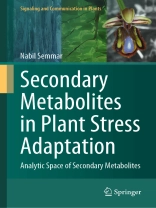This book covers correlation and combined disciplinary aspects implying the use of secondary metabolites (SMs) of different plant species for control and monitoring of environment states. Phytochemical management of ecological systems represents an integrative field aiming for determination/evaluation of environment conditions from qualitative and quantitative analysis of plant metabolites. Plants respond to environmental conditions through productions of secondary metabolites. SMs represent highly variable and sensitive phytocompounds because of their small produced amounts, high structural variability and diversified activities. These characteristics make variations of SMs in plants to be highly informative on environmental conditions, physiological states and biological interactions. Qualitative and quantitative variations of SMs in plants are subject to correlation analyses to highlight links between biotic/abiotic conditions and plant chemical patterns.
Table des matières
Introduction.- Part I. Overview on Governing Factors of Phytochemical Diversity, Variational Aspects of Secondary Metabolites.- Variational Factors and Regulation Processes of Secondary Metabolites.- Overview on Structural and Functional Diversity of Secondary Metabolites.- Part II. Biosynthetic Pathways, Structural Diversification Processes and Roles of Different Secondary Metabolite Families, Phenolic Compounds.- Terpenes.- Nitrogen-Containing Compounds.- Part III. Secondary Metabolites as Plant Responses to Abiotic Stresses, Temperature-Linked Constraints and Plant Protection Needs.- Water-Linked Constraints and Plant Protection Needs.- Light Stress.- Ozone Stress.- Part IV. Roles of Secondary Metabolites in Biotic Interactions of Plants, Overview on Different Biotic Interactions Involving Phytochemical Signals.- Plant Defense Against Pathogen Attacks.- Plant Defense Against Herbivore Attacks.- Index.
A propos de l’auteur
Nabil Semmar has Ph.D. in phytochemistry with a multidisciplinary training pattern combining applied statistical analyses to different biological fields including environmental sciences (marine, terrestrial: bachelor degree), biotechnologies (master) and pharmacology (postdoctoral researches). In his Ph.D. (Lyon, 2000), he studied the flavonoids and saponins in the leaves and roots of Astragalus caprinus (Fabaceae). During his Ph.D., he developed a new simulation approach based on simplex rule (mass conservation law) helping for computational analysis of metabolic pathways and chemical polymorphism at population scale from HPLC data. Publication of this approach was followed by the invitation of N. Semmar by IAEA (Vienna, 2008) for conference and project discussion. Nabil Semmar carried out several correlation analyses between quantitative and qualitative aspects of secondary metabolites (as well as primary metabolites and drugs) leading to highlight mass distributionand metabolic regulation processes governing structural variability and sequential biosynthesis ways in plant matrices, pharmacological systems and environment.












